Nursing Reflection: Interpersonal Communication Skills in Nursing
VerifiedAdded on 2022/08/29
|5
|1215
|36
Essay
AI Summary
This nursing reflection essay critically analyzes a student's experience with interpersonal communication skills within a healthcare setting, specifically focusing on the application of empathy, active listening, and cultural competence in nurse-patient interactions. The essay explores the challenges faced when communicating with patients from diverse sociocultural backgrounds and highlights the importance of empathy as a crucial component of cultural competence. The student reflects on the significance of active listening, summarizing, and other interpersonal techniques in building effective nurse-patient relationships and providing patient-centered care. The essay references relevant literature to support the arguments and demonstrates how effective communication contributes to improved patient outcomes, particularly within intensive care and critical care units. It emphasizes the need for respect, dignity, and mutual regard in interactions with patients and healthcare team members to foster therapeutic collaboration and enhance the overall quality of care.
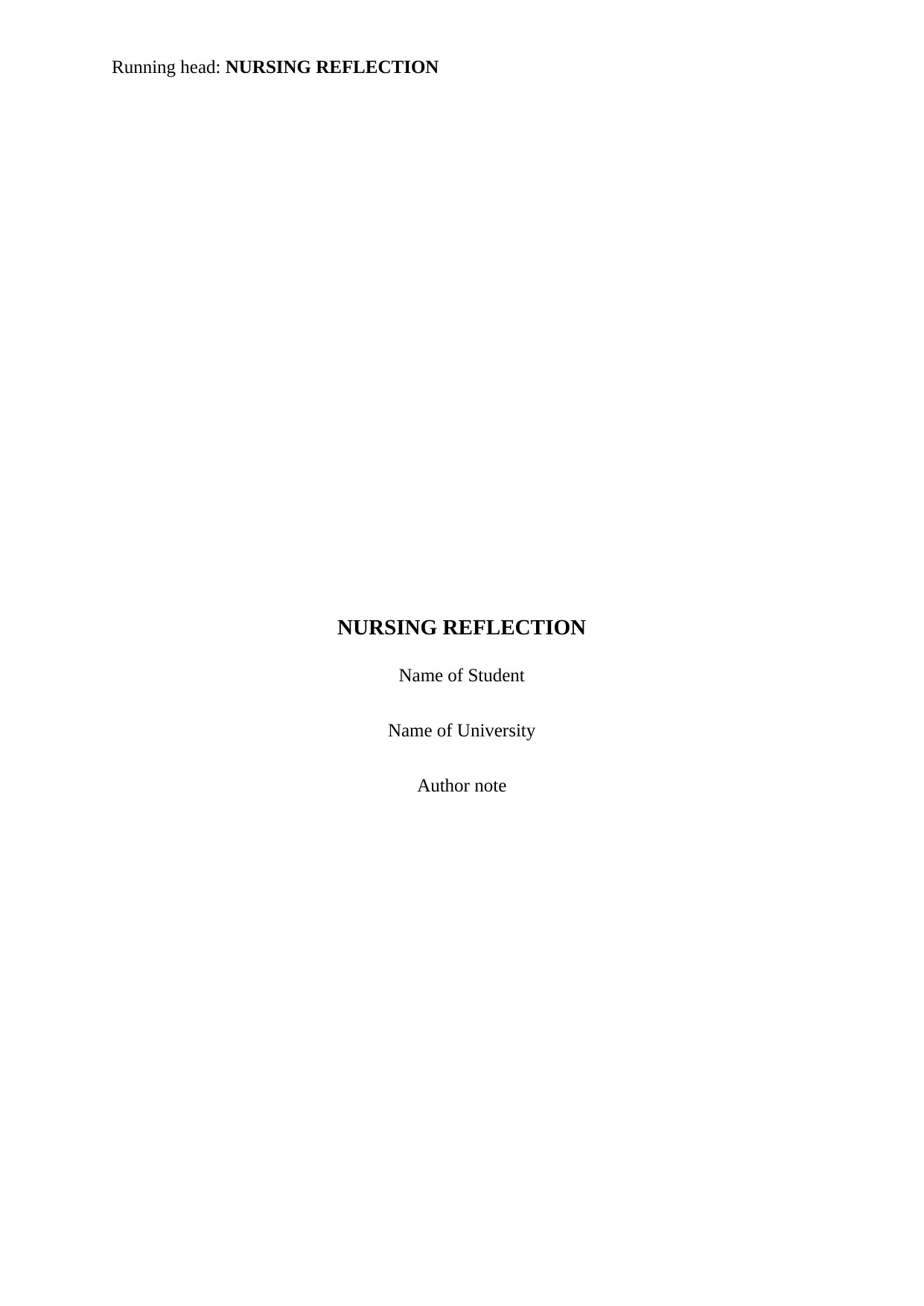
Running head: NURSING REFLECTION
NURSING REFLECTION
Name of Student
Name of University
Author note
NURSING REFLECTION
Name of Student
Name of University
Author note
Paraphrase This Document
Need a fresh take? Get an instant paraphrase of this document with our AI Paraphraser
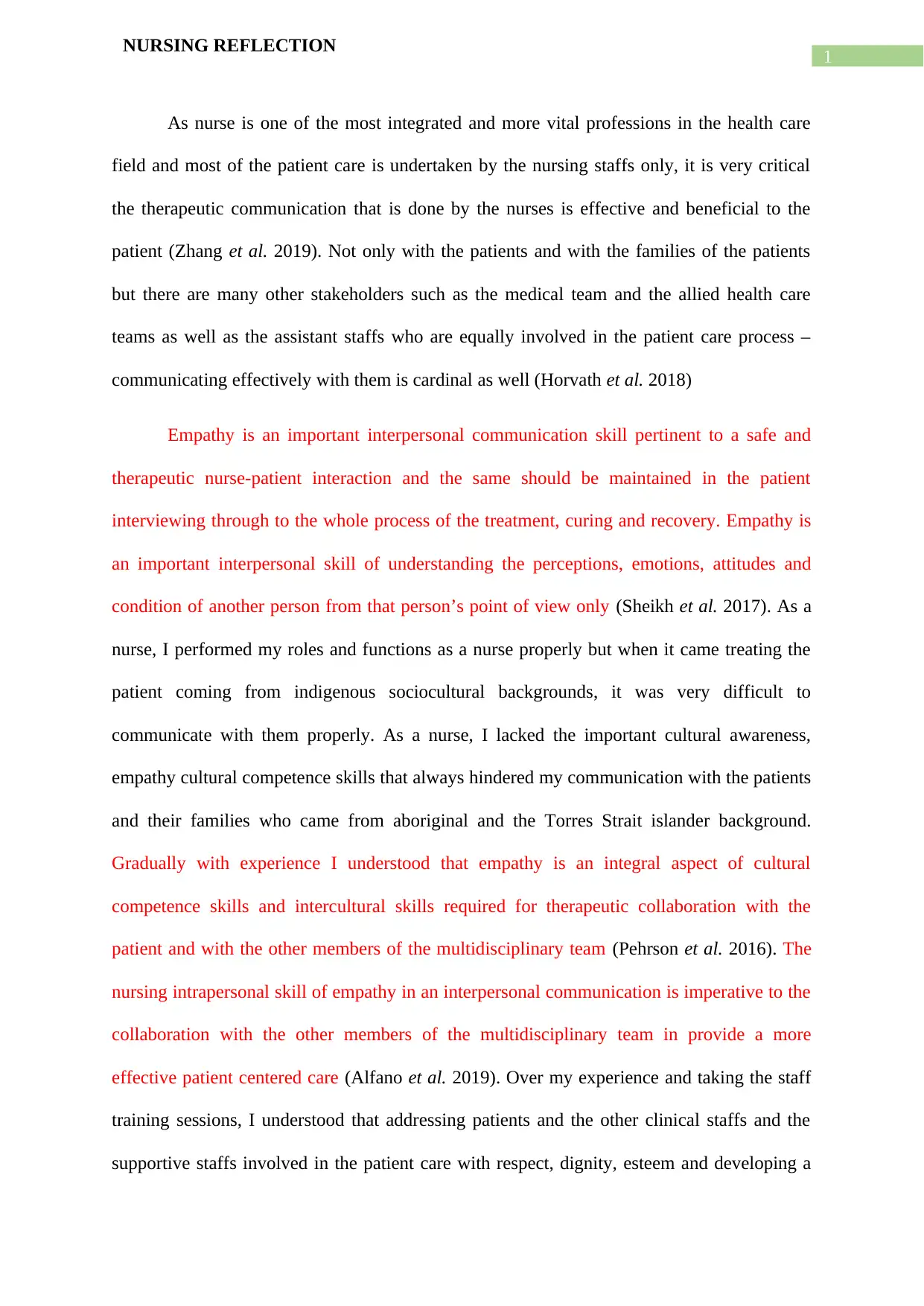
1
NURSING REFLECTION
As nurse is one of the most integrated and more vital professions in the health care
field and most of the patient care is undertaken by the nursing staffs only, it is very critical
the therapeutic communication that is done by the nurses is effective and beneficial to the
patient (Zhang et al. 2019). Not only with the patients and with the families of the patients
but there are many other stakeholders such as the medical team and the allied health care
teams as well as the assistant staffs who are equally involved in the patient care process –
communicating effectively with them is cardinal as well (Horvath et al. 2018)
Empathy is an important interpersonal communication skill pertinent to a safe and
therapeutic nurse-patient interaction and the same should be maintained in the patient
interviewing through to the whole process of the treatment, curing and recovery. Empathy is
an important interpersonal skill of understanding the perceptions, emotions, attitudes and
condition of another person from that person’s point of view only (Sheikh et al. 2017). As a
nurse, I performed my roles and functions as a nurse properly but when it came treating the
patient coming from indigenous sociocultural backgrounds, it was very difficult to
communicate with them properly. As a nurse, I lacked the important cultural awareness,
empathy cultural competence skills that always hindered my communication with the patients
and their families who came from aboriginal and the Torres Strait islander background.
Gradually with experience I understood that empathy is an integral aspect of cultural
competence skills and intercultural skills required for therapeutic collaboration with the
patient and with the other members of the multidisciplinary team (Pehrson et al. 2016). The
nursing intrapersonal skill of empathy in an interpersonal communication is imperative to the
collaboration with the other members of the multidisciplinary team in provide a more
effective patient centered care (Alfano et al. 2019). Over my experience and taking the staff
training sessions, I understood that addressing patients and the other clinical staffs and the
supportive staffs involved in the patient care with respect, dignity, esteem and developing a
NURSING REFLECTION
As nurse is one of the most integrated and more vital professions in the health care
field and most of the patient care is undertaken by the nursing staffs only, it is very critical
the therapeutic communication that is done by the nurses is effective and beneficial to the
patient (Zhang et al. 2019). Not only with the patients and with the families of the patients
but there are many other stakeholders such as the medical team and the allied health care
teams as well as the assistant staffs who are equally involved in the patient care process –
communicating effectively with them is cardinal as well (Horvath et al. 2018)
Empathy is an important interpersonal communication skill pertinent to a safe and
therapeutic nurse-patient interaction and the same should be maintained in the patient
interviewing through to the whole process of the treatment, curing and recovery. Empathy is
an important interpersonal skill of understanding the perceptions, emotions, attitudes and
condition of another person from that person’s point of view only (Sheikh et al. 2017). As a
nurse, I performed my roles and functions as a nurse properly but when it came treating the
patient coming from indigenous sociocultural backgrounds, it was very difficult to
communicate with them properly. As a nurse, I lacked the important cultural awareness,
empathy cultural competence skills that always hindered my communication with the patients
and their families who came from aboriginal and the Torres Strait islander background.
Gradually with experience I understood that empathy is an integral aspect of cultural
competence skills and intercultural skills required for therapeutic collaboration with the
patient and with the other members of the multidisciplinary team (Pehrson et al. 2016). The
nursing intrapersonal skill of empathy in an interpersonal communication is imperative to the
collaboration with the other members of the multidisciplinary team in provide a more
effective patient centered care (Alfano et al. 2019). Over my experience and taking the staff
training sessions, I understood that addressing patients and the other clinical staffs and the
supportive staffs involved in the patient care with respect, dignity, esteem and developing a
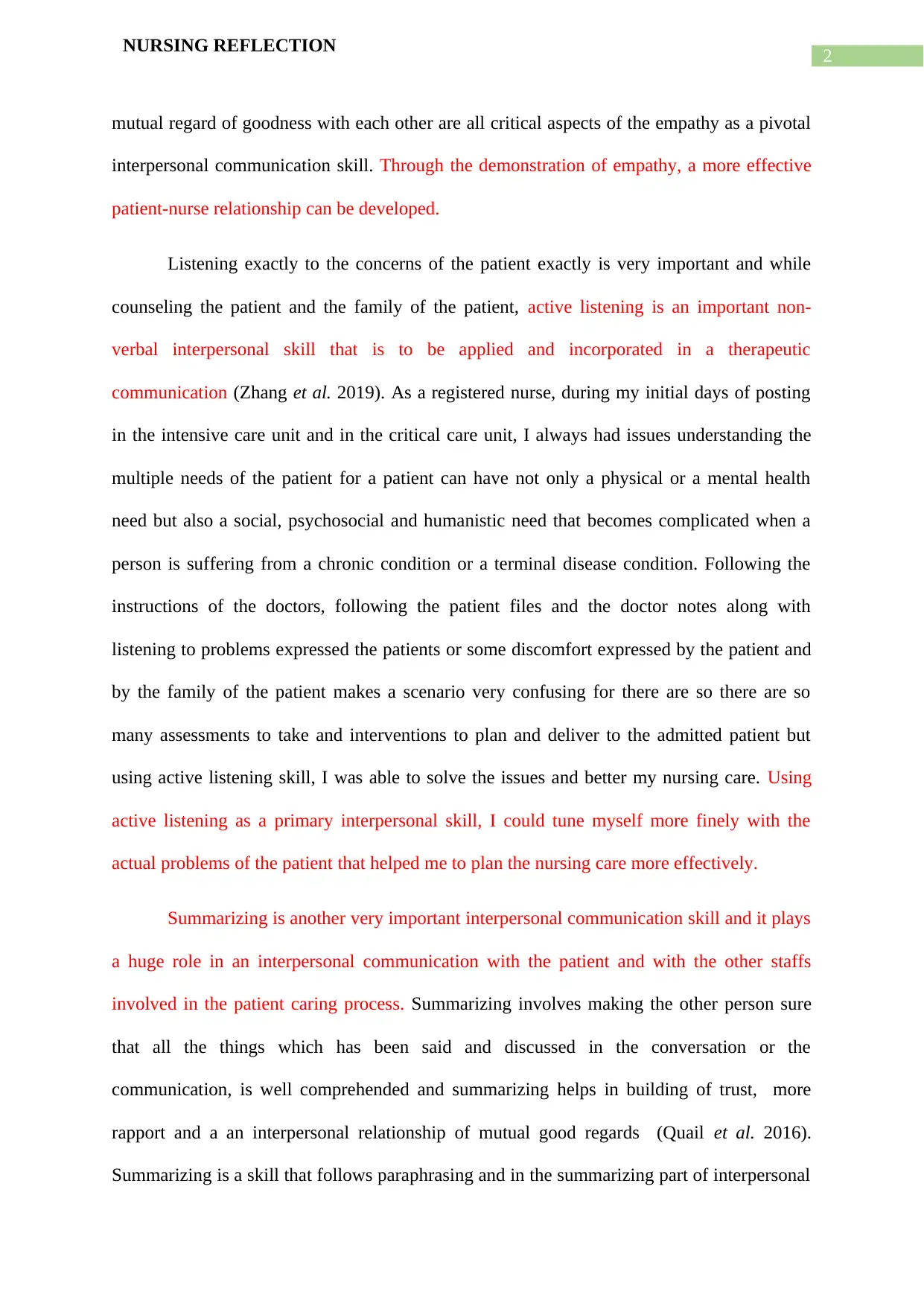
2
NURSING REFLECTION
mutual regard of goodness with each other are all critical aspects of the empathy as a pivotal
interpersonal communication skill. Through the demonstration of empathy, a more effective
patient-nurse relationship can be developed.
Listening exactly to the concerns of the patient exactly is very important and while
counseling the patient and the family of the patient, active listening is an important non-
verbal interpersonal skill that is to be applied and incorporated in a therapeutic
communication (Zhang et al. 2019). As a registered nurse, during my initial days of posting
in the intensive care unit and in the critical care unit, I always had issues understanding the
multiple needs of the patient for a patient can have not only a physical or a mental health
need but also a social, psychosocial and humanistic need that becomes complicated when a
person is suffering from a chronic condition or a terminal disease condition. Following the
instructions of the doctors, following the patient files and the doctor notes along with
listening to problems expressed the patients or some discomfort expressed by the patient and
by the family of the patient makes a scenario very confusing for there are so there are so
many assessments to take and interventions to plan and deliver to the admitted patient but
using active listening skill, I was able to solve the issues and better my nursing care. Using
active listening as a primary interpersonal skill, I could tune myself more finely with the
actual problems of the patient that helped me to plan the nursing care more effectively.
Summarizing is another very important interpersonal communication skill and it plays
a huge role in an interpersonal communication with the patient and with the other staffs
involved in the patient caring process. Summarizing involves making the other person sure
that all the things which has been said and discussed in the conversation or the
communication, is well comprehended and summarizing helps in building of trust, more
rapport and a an interpersonal relationship of mutual good regards (Quail et al. 2016).
Summarizing is a skill that follows paraphrasing and in the summarizing part of interpersonal
NURSING REFLECTION
mutual regard of goodness with each other are all critical aspects of the empathy as a pivotal
interpersonal communication skill. Through the demonstration of empathy, a more effective
patient-nurse relationship can be developed.
Listening exactly to the concerns of the patient exactly is very important and while
counseling the patient and the family of the patient, active listening is an important non-
verbal interpersonal skill that is to be applied and incorporated in a therapeutic
communication (Zhang et al. 2019). As a registered nurse, during my initial days of posting
in the intensive care unit and in the critical care unit, I always had issues understanding the
multiple needs of the patient for a patient can have not only a physical or a mental health
need but also a social, psychosocial and humanistic need that becomes complicated when a
person is suffering from a chronic condition or a terminal disease condition. Following the
instructions of the doctors, following the patient files and the doctor notes along with
listening to problems expressed the patients or some discomfort expressed by the patient and
by the family of the patient makes a scenario very confusing for there are so there are so
many assessments to take and interventions to plan and deliver to the admitted patient but
using active listening skill, I was able to solve the issues and better my nursing care. Using
active listening as a primary interpersonal skill, I could tune myself more finely with the
actual problems of the patient that helped me to plan the nursing care more effectively.
Summarizing is another very important interpersonal communication skill and it plays
a huge role in an interpersonal communication with the patient and with the other staffs
involved in the patient caring process. Summarizing involves making the other person sure
that all the things which has been said and discussed in the conversation or the
communication, is well comprehended and summarizing helps in building of trust, more
rapport and a an interpersonal relationship of mutual good regards (Quail et al. 2016).
Summarizing is a skill that follows paraphrasing and in the summarizing part of interpersonal
⊘ This is a preview!⊘
Do you want full access?
Subscribe today to unlock all pages.

Trusted by 1+ million students worldwide
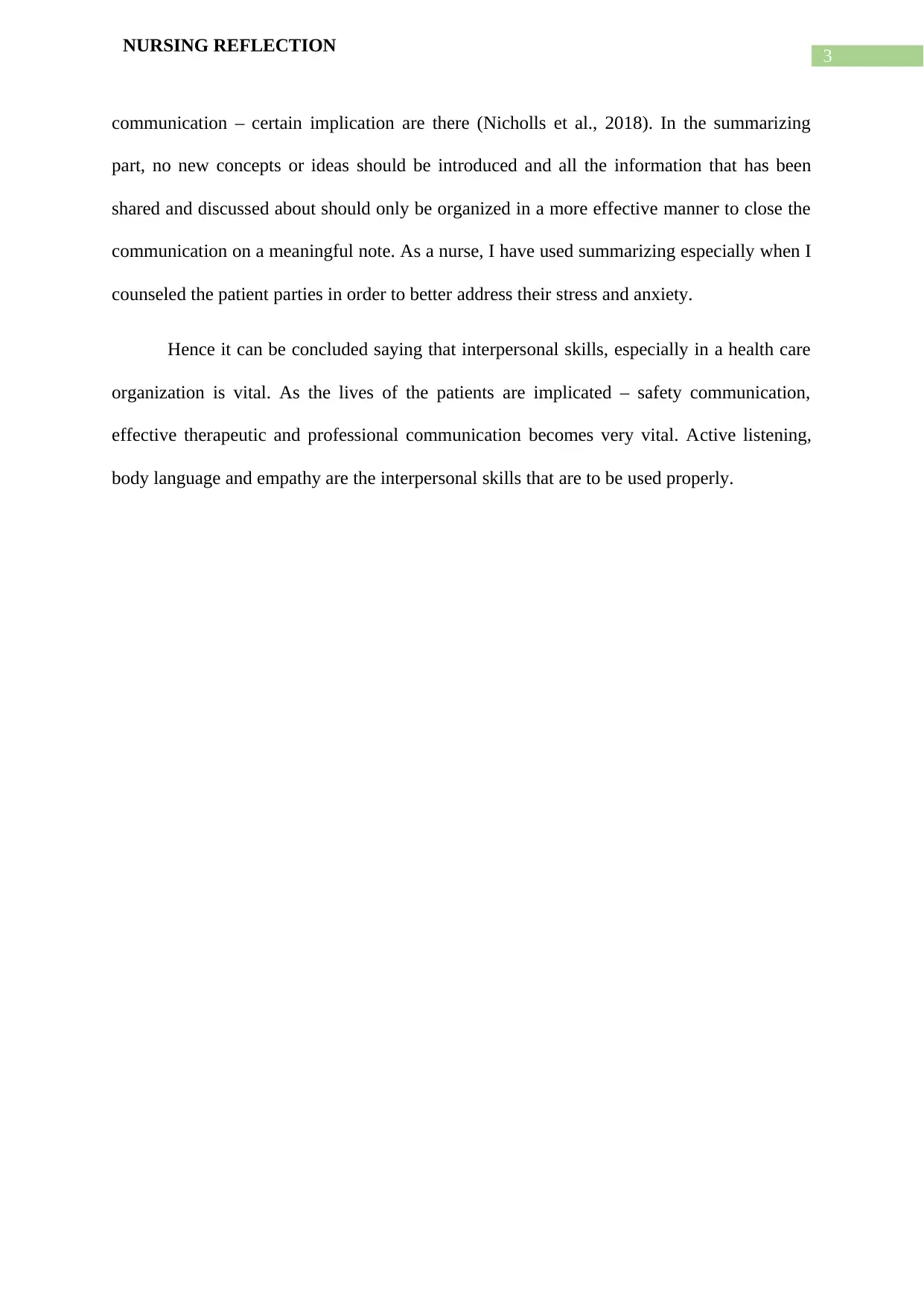
3
NURSING REFLECTION
communication – certain implication are there (Nicholls et al., 2018). In the summarizing
part, no new concepts or ideas should be introduced and all the information that has been
shared and discussed about should only be organized in a more effective manner to close the
communication on a meaningful note. As a nurse, I have used summarizing especially when I
counseled the patient parties in order to better address their stress and anxiety.
Hence it can be concluded saying that interpersonal skills, especially in a health care
organization is vital. As the lives of the patients are implicated – safety communication,
effective therapeutic and professional communication becomes very vital. Active listening,
body language and empathy are the interpersonal skills that are to be used properly.
NURSING REFLECTION
communication – certain implication are there (Nicholls et al., 2018). In the summarizing
part, no new concepts or ideas should be introduced and all the information that has been
shared and discussed about should only be organized in a more effective manner to close the
communication on a meaningful note. As a nurse, I have used summarizing especially when I
counseled the patient parties in order to better address their stress and anxiety.
Hence it can be concluded saying that interpersonal skills, especially in a health care
organization is vital. As the lives of the patients are implicated – safety communication,
effective therapeutic and professional communication becomes very vital. Active listening,
body language and empathy are the interpersonal skills that are to be used properly.
Paraphrase This Document
Need a fresh take? Get an instant paraphrase of this document with our AI Paraphraser
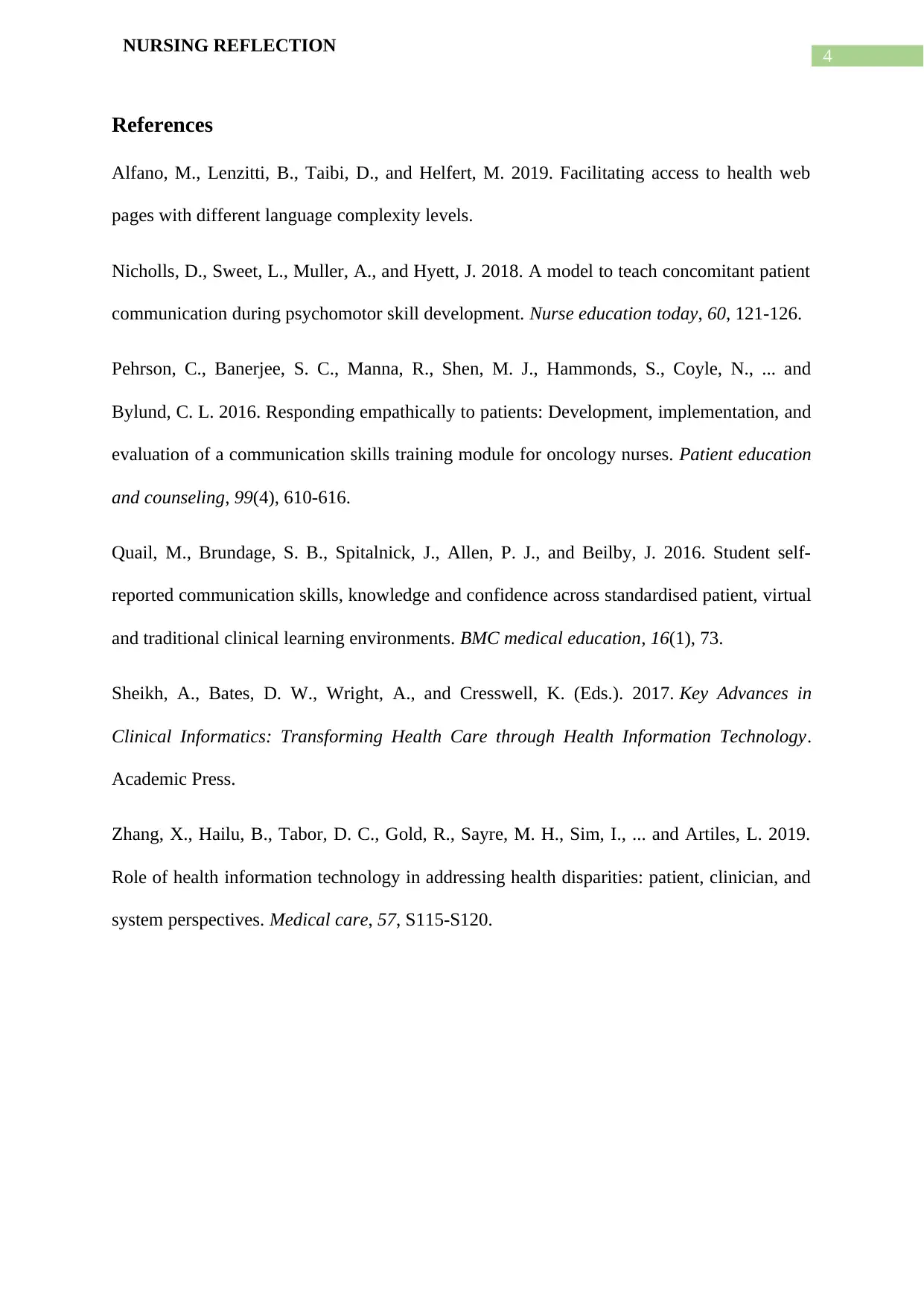
4
NURSING REFLECTION
References
Alfano, M., Lenzitti, B., Taibi, D., and Helfert, M. 2019. Facilitating access to health web
pages with different language complexity levels.
Nicholls, D., Sweet, L., Muller, A., and Hyett, J. 2018. A model to teach concomitant patient
communication during psychomotor skill development. Nurse education today, 60, 121-126.
Pehrson, C., Banerjee, S. C., Manna, R., Shen, M. J., Hammonds, S., Coyle, N., ... and
Bylund, C. L. 2016. Responding empathically to patients: Development, implementation, and
evaluation of a communication skills training module for oncology nurses. Patient education
and counseling, 99(4), 610-616.
Quail, M., Brundage, S. B., Spitalnick, J., Allen, P. J., and Beilby, J. 2016. Student self-
reported communication skills, knowledge and confidence across standardised patient, virtual
and traditional clinical learning environments. BMC medical education, 16(1), 73.
Sheikh, A., Bates, D. W., Wright, A., and Cresswell, K. (Eds.). 2017. Key Advances in
Clinical Informatics: Transforming Health Care through Health Information Technology.
Academic Press.
Zhang, X., Hailu, B., Tabor, D. C., Gold, R., Sayre, M. H., Sim, I., ... and Artiles, L. 2019.
Role of health information technology in addressing health disparities: patient, clinician, and
system perspectives. Medical care, 57, S115-S120.
NURSING REFLECTION
References
Alfano, M., Lenzitti, B., Taibi, D., and Helfert, M. 2019. Facilitating access to health web
pages with different language complexity levels.
Nicholls, D., Sweet, L., Muller, A., and Hyett, J. 2018. A model to teach concomitant patient
communication during psychomotor skill development. Nurse education today, 60, 121-126.
Pehrson, C., Banerjee, S. C., Manna, R., Shen, M. J., Hammonds, S., Coyle, N., ... and
Bylund, C. L. 2016. Responding empathically to patients: Development, implementation, and
evaluation of a communication skills training module for oncology nurses. Patient education
and counseling, 99(4), 610-616.
Quail, M., Brundage, S. B., Spitalnick, J., Allen, P. J., and Beilby, J. 2016. Student self-
reported communication skills, knowledge and confidence across standardised patient, virtual
and traditional clinical learning environments. BMC medical education, 16(1), 73.
Sheikh, A., Bates, D. W., Wright, A., and Cresswell, K. (Eds.). 2017. Key Advances in
Clinical Informatics: Transforming Health Care through Health Information Technology.
Academic Press.
Zhang, X., Hailu, B., Tabor, D. C., Gold, R., Sayre, M. H., Sim, I., ... and Artiles, L. 2019.
Role of health information technology in addressing health disparities: patient, clinician, and
system perspectives. Medical care, 57, S115-S120.
1 out of 5
Related Documents
Your All-in-One AI-Powered Toolkit for Academic Success.
+13062052269
info@desklib.com
Available 24*7 on WhatsApp / Email
![[object Object]](/_next/static/media/star-bottom.7253800d.svg)
Unlock your academic potential
© 2024 | Zucol Services PVT LTD | All rights reserved.





